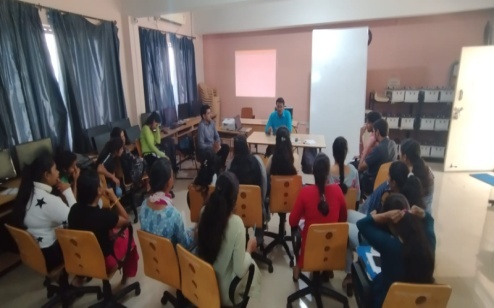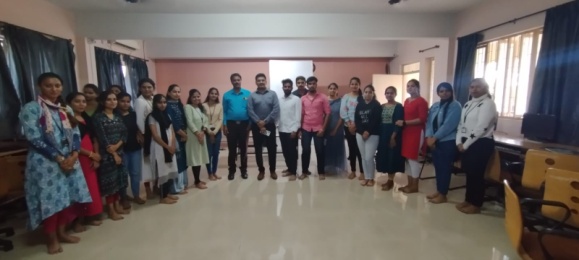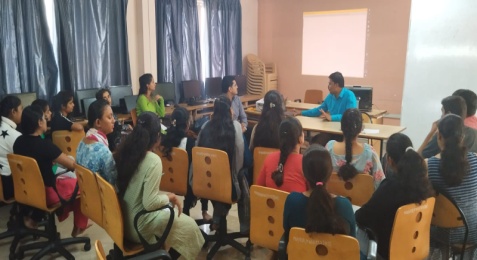HR Payroll Workshop

HR Payroll Workshop
ADVANCED HR PRACTICAL TRAINING
The HR Payroll Workshop conducted during the week of 04-09-2023 to 09-09-2023 proved to be an invaluable educational experience for MSW (Master of Social Work) and MBA (Master of Business Administration) students. The workshop was led by Mr. Adarsh N, an accomplished expert in the field of Human Resources, with a primary focus on Payroll management. This comprehensive program aimed to equip students with essential knowledge and practical skills related to HR and Payroll functions.
Day 1:
Employee and HR Functions
Employee Functions:
- Selection: This session emphasized the critical process of selecting the right candidates for job positions, highlighting various methods of candidate evaluation and assessment.
- Induction: The importance of a structured induction program for new employees was discussed, including its role in acclimating new hires to the organization’s culture and processes.
- Training and Development:The workshop delved into the significance of continuous training and development programs in enhancing employee skills and knowledge.
- Employee Engagement: Strategies for fostering employee engagement were explored, including techniques to motivate and retain valuable talent.
- Performance Appraisal: The session detailed the intricacies of performance appraisal systems, their objectives, and their role in employee development and organizational success.
HR Functions:
- Recruitment:The recruitment process, from job posting to candidate selection, was thoroughly explained, highlighting best practices for attracting and hiring top talent.
- Payroll:The central focus of the workshop, the Payroll function, was explored in-depth, including the calculation of salaries, tax deductions, and compliance with legal regulations.
- Welfare:The importance of employee welfare programs, such as health and wellness initiatives, was discussed in the context of fostering a healthy work environment.
- Admin: Administrative functions within HR, including record-keeping and documentation, were covered to underscore their role in maintaining an efficient HR department.
- IR and ER (Industrial Relations and Employee Relations):Understanding the dynamics of labor relations, conflict resolution, and maintaining harmonious workplace relationships were key topics in this segment.
- General Issues: Common HR challenges and their resolutions were discussed, providing students with real-world insights into HR problem-solving.
- Compliance: The legal and regulatory aspects of HR and Payroll, including labor laws and tax compliance, were emphasized to ensure students understood the importance of adhering to legal standards.
The HR Payroll Workshop’s Day 1 session laid a strong foundation for students by comprehensively covering the various facets of HR and Payroll functions. Mr. Adarsh N’s expertise and practical insights added significant value to the program. The workshop promised to provide students with a holistic understanding of HR practices and prepare them for the challenges of managing Payroll functions in a professional setting.
Day 2:
Payroll Components and Practical Exercises
- Calculation of CTC (Cost to Company): This session began with a comprehensive exploration of the concept of CTC, including its components such as basic salary, allowances, and benefits. Participants learned how to calculate CTC accurately, a vital skill for HR professionals. Allowances (HRA, CA, MA, LTA, SA):Various allowances like House Rent Allowance (HRA), Conveyance Allowance (CA), Medical Allowance (MA), Leave Travel Allowance (LTA), and Special Allowance (SA) were discussed. Students gained an understanding of how these allowances contribute to an employee’s overall compensation.
- ESI (Employee State Insurance):This segment focused on the legal requirement of ESI, its applicability, and the calculation process. The importance of compliance with ESI regulations was emphasized.
- PF (Provident Fund):The workshop detailed the Provident Fund and its significance, including both the employee and employer contributions. Students learned about PF calculations and the related statutory requirements.
- Bonus: Understanding the calculation and disbursement of bonuses, including the legal aspects of bonus payments, was covered in this session.
- Gratuity: Participants learned about the concept of gratuity and its calculation based on the length of service. Legal obligations regarding gratuity were discussed to ensure compliance.
- Leaves:The workshop addressed different types of leaves, such as earned leave, sick leave, and casual leave. Participants gained insight into leave policies and their administration.
- Loss of Pay:Handling situations involving loss of pay, its impact on salary calculations, and relevant HR procedures were explained in this segment.
- Practical Classes of Salary Register: The day concluded with hands-on exercises involving the preparation and maintenance of salary registers. Students applied the knowledge gained throughout the day to practical scenarios, solidifying their understanding of Payroll management.
As the workshop progressed, students not only expanded their theoretical knowledge but also developed practical skills that would prove indispensable in their future roles within HR and Payroll departments. The workshop remained a success, building on the strong foundation established in Day 1 and preparing participants for the complex challenges of managing Payroll functions in professional settings.
Day 3:
Payroll Processing and Practical Applications
- Net Salary Calculation: The session began with an in-depth exploration of how to calculate an employee’s net salary, taking into account deductions, taxes, and allowances. This knowledge is fundamental for HR professionals responsible for payroll processing.
- Deductions:Participants learned about various deductions that may apply to an employee’s salary, including income tax, professional tax, and loan repayments. The workshop emphasized the importance of accurately calculating and documenting these deductions.
- Overtime (OT) Hours:The concept of overtime hours and their calculation were discussed, emphasizing the legal requirements and compensation for overtime work.
- ESI Benefits: Continuing from Day 2, the workshop provided further insights into Employee State Insurance (ESI), focusing on the benefits it offers to employees and the compliance requirements for employers.
- Wage Slip Preparation: Participants were guided on how to create wage slips, which are essential documents for employees. This included the format, content, and legal aspects of wage slips.
- Calculation in Excel Sheet: An integral part of modern HR and payroll management is the use of technology. Students were taught how to create and use Excel sheets for efficient and error-free payroll calculations.
The session on net salary calculation, deductions, and wage slip preparation equipped participants with the skills necessary to accurately compute and document payroll information. Additionally, the practical training in using Excel sheets for payroll calculations was particularly valuable, as it showcased a widely used tool in HR and Payroll departments.
Day 4:
HR and Payroll Management
- EPF Act (Employees’ Provident Fund Act): The session commenced with an in-depth exploration of the Employees’ Provident Fund Act, highlighting its significance in securing employees’ retirement savings and the legal obligations it places on employers.
- Contribution Rights: Participants were educated about the rights and responsibilities of both employees and employers concerning Provident Fund contributions, ensuring clarity on the financial aspects of the EPF.
- PF Account and Its Benefits: The workshop delved into the functioning of Provident Fund accounts, their benefits, and the role they play in employees’ financial security and retirement planning.
- Recruitment Process: The session transitioned to the recruitment process, encompassing various stages, from job posting and sourcing candidates to conducting interviews and making job offers. This segment aimed to equip students with the essential skills required in the recruitment of talent.
- Employee Engagement: The importance of employee engagement for organizational productivity and morale was emphasized, along with strategies for fostering a positive workplace culture.
- Employee Retention: This segment focused on the significance of retaining talent within an organization and explored retention strategies, such as career development and incentives.
- Employee Exit Formalities: Students learned about the procedures and documentation required during the employee exit process, ensuring a smooth transition for departing employees.
- Practical Classes: Salary Slip and PF Wage Sheet: The day concluded with practical exercises involving the preparation of salary slips and PF wage sheets. Participants applied their knowledge and skills to create accurate and compliant documents.
The session on EPF Act, contribution rights, and PF accounts equipped students with a comprehensive understanding of Provident Fund management, which is crucial for HR professionals. Additionally, the coverage of recruitment processes, employee engagement, and retention strategies provided participants with valuable tools for building and maintaining a talented workforce.The practical exercises involving salary slips and PF wage sheets further reinforced the participants’ skills and readiness for real-world HR and payroll management tasks.
Day 5
HR, Payroll, and Labor Relations
- Industrial Relations: The session commenced with an exploration of industrial relations, focusing on the relationship between employees, employers, and labor unions. Participants learned about dispute resolution, negotiations, and maintaining a harmonious work environment.
- Code of Wage: The workshop provided insights into the Code of Wages, emphasizing its importance in regulating wage and salary structures and ensuring fairness and compliance in compensation.
- Competency Metrics: The concept of competency metrics was discussed, demonstrating how organizations measure and assess employee skills and capabilities to make informed HR decisions.
- Skill Metrics: Participants learned about skill metrics, which are instrumental in identifying skill gaps within the workforce and devising strategies for skill development and enhancement.
- Calculation of LOP (Loss of Pay): The session addressed the calculation of Loss of Pay for employees who are absent from work without proper authorization. The workshop highlighted the importance of documenting and calculating LOP accurately.
- PF Advance: Students were educated about the process of providing PF advances to employees, the eligibility criteria, and the documentation involved in facilitating such requests.
- PF Calculation Challan: The workshop concluded with a practical exercise on PF calculation challan, where participants learned to create accurate PF payment documents while adhering to regulatory requirements.
The session on industrial relations was particularly important, as it shed light on conflict resolution and maintaining a productive work environment. Additionally, discussions on wage regulations and competency metrics equipped students with the tools necessary for effective HR decision-making.The practical exercise on PF calculation challan further reinforced the participants’ ability to perform payroll-related tasks accurately and in compliance with legal standards.
Day 6:
Labor Laws and Online Compliance
- Contract Labor Abolition Act: Mr. Veeresh Angadi commenced the session by discussing the Contract Labor Abolition Act. Students gained an understanding of the Act’s provisions and its significance in regulating and ensuring the welfare of contract workers.
- E-Challan: The workshop addressed the concept of E-Challan, emphasizing its role in digital payment processes and the advantages it offers in terms of efficiency and transparency in financial transactions.
- How to Register ESI and PF through Online Portals: Participants received practical guidance on the online registration processes for ESI and PF, including step-by-step instructions for creating accounts, submitting documents, and ensuring compliance through digital platforms.
The discussion on E-Challan introduced participants to modern payment methods and their role in streamlining financial transactions. Additionally, the practical instructions on how to register for ESI and PF through online portals empowered students with the knowledge and skills required to ensure compliance with these essential employment benefits.
The HR Payroll Workshop marked the conclusion of a highly informative and educational program. Mr. Veeresh Angadi’s expertise added significant value to the workshop by providing students with practical insights into critical aspects of labor laws, compliance, and online registration procedures, enabling students to develop practical skills and knowledge that would undoubtedly prove beneficial in their future careers in HR and Payroll management. Gaining practical insights and hands-on experience in various areas of the field.
Overall, the workshop was a resounding success and received positive feedback from the participants, positioning it as a valuable asset in their educational journey.
Resource person profile:
Mr. Adarsh N, head Trainer, HR Zone
He has completed his graduation from SJCE, Mysore. He has 8+ years of experience in core HR Domain from different reputed organization. He started his career from talent acquisition and doing HR admin works, now he become the proprietor of HR Zone, a company that works to outsource payroll and handling statutory compliance of the companies, also aims to provide practical training for HR Students. He is passionate about teaching and sharing his experience with the younger talent to make their transition easier from college life to corporate life
Additional Details
Registration email/URL -




